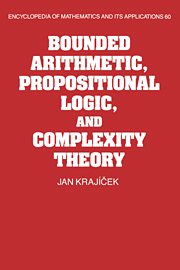Book contents
- Frontmatter
- Contents
- Preface
- Acknowledgments
- 1 Introduction
- 2 Preliminaries
- 3 Basic complexity theory
- 4 Basic propositional logic
- 5 Basic bounded arithmetic
- 6 Definability of computations
- 7 Witnessing theorems
- 8 Definability and witnessing in second order theories
- 9 Translations of arithmetic formulas
- 10 Finite axiomatizability problem
- 11 Direct independence proofs
- 12 Bounds for constant-depth Frege systems
- 13 Bounds for Frege and extended Frege systems
- 14 Hard tautologies and optimal proof systems
- 15 Strength of bounded arithmetic
- References
- Subject index
- Name index
- Symbol index
15 - Strength of bounded arithmetic
Published online by Cambridge University Press: 02 December 2009
- Frontmatter
- Contents
- Preface
- Acknowledgments
- 1 Introduction
- 2 Preliminaries
- 3 Basic complexity theory
- 4 Basic propositional logic
- 5 Basic bounded arithmetic
- 6 Definability of computations
- 7 Witnessing theorems
- 8 Definability and witnessing in second order theories
- 9 Translations of arithmetic formulas
- 10 Finite axiomatizability problem
- 11 Direct independence proofs
- 12 Bounds for constant-depth Frege systems
- 13 Bounds for Frege and extended Frege systems
- 14 Hard tautologies and optimal proof systems
- 15 Strength of bounded arithmetic
- References
- Subject index
- Name index
- Symbol index
Summary
The previous chapters dealt mostly with the metamathematical properties of the systems of bounded arithmetic and of the propositional proof systems. We studied the provability and the definability in these systems and their various relations. The reader has by now perhaps some feeling for the strength of the systems. In this chapter we shall consider the provability of several combinatorial facts in bounded arithmetic.
In the first section we study the counting functions for predicates in PH, the boundedPHP, the approximate counting, and the provability of the infinitude of primes. In the second section we demonstrate that a lower bound on the size of constant-depth circuits can be meaningfully formalized and proved in bounded arithmetic. The last, third section studies some questions related to the main problem whether there is a model of S2 in which the polynomial-time hierarchy does not collapse.
Counting
A crucial property that allows a theory to prove a lot of elementary combinatorial facts is counting. In the context of bounded arithmetic this would require having definitions of the counting functions for predicates.
The uniform counting is not available.
Theorem 15.1.1. There is no -formula θ(a, a) that would define for each set a and each n υ ω the parity of the set {x υ n | a (x)}.
Information
- Type
- Chapter
- Information
- Bounded Arithmetic, Propositional Logic and Complexity Theory , pp. 308 - 326Publisher: Cambridge University PressPrint publication year: 1995
